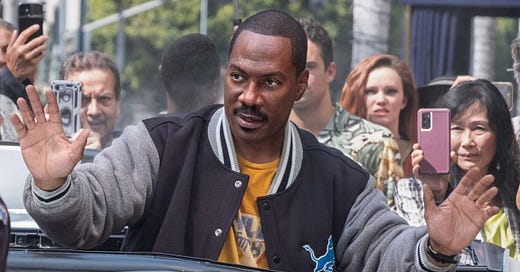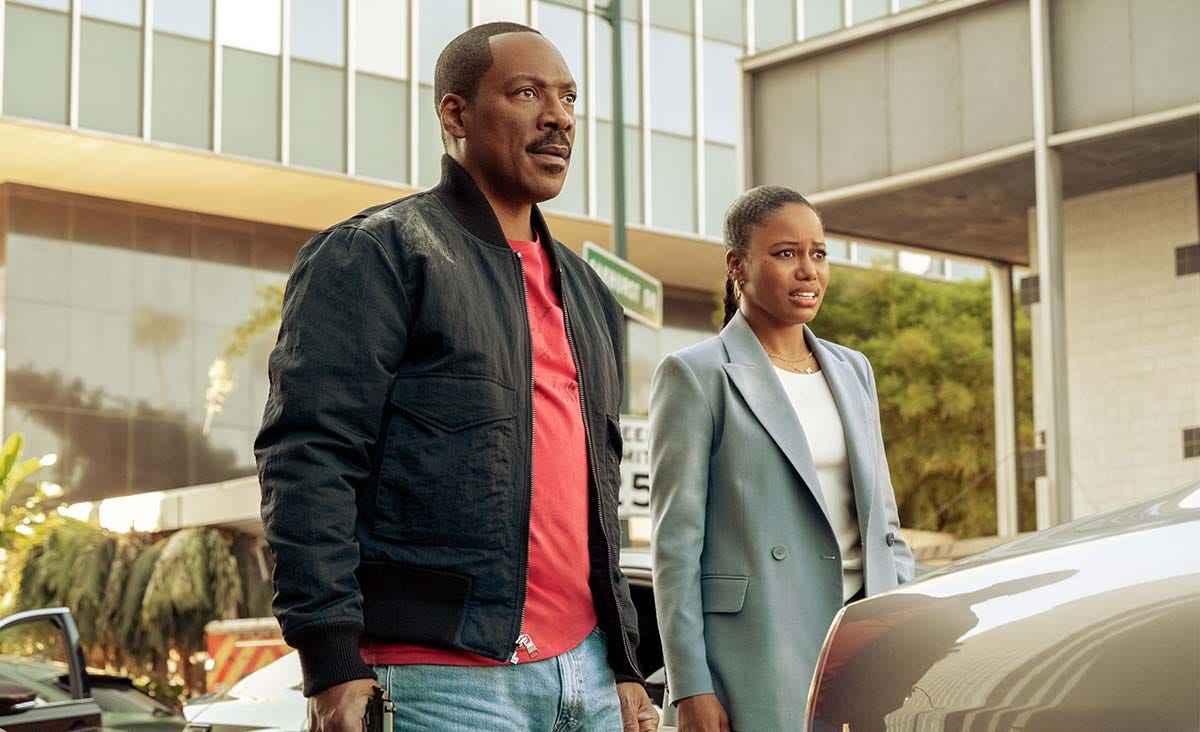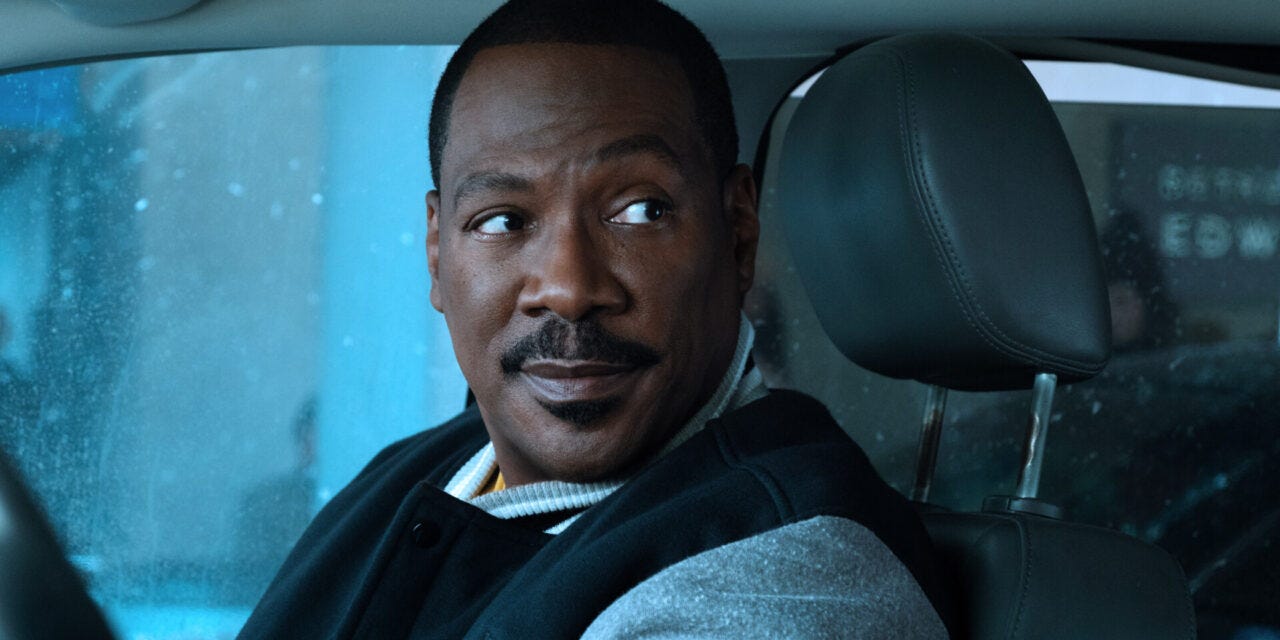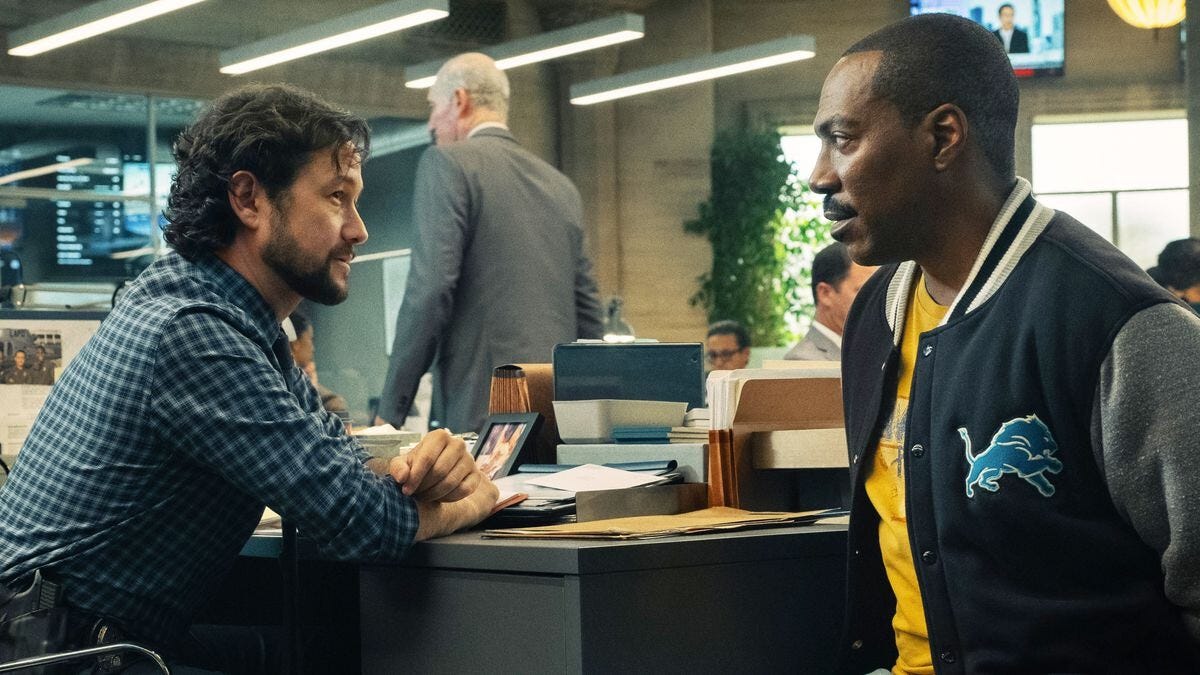Beverly Hills Cop: Axel F (2024)
Eddie Murphy's Axel Foley, still fun, could do with more smarts and less mouth
Axel cop-stopped and people-crushed in Beverly Hills, where he insists: “They love me”
Beverly Hills Cop: Axel F (2024)
In theaters and streaming on Netflix
What if Axel Foley stayed in Detroit? By the end of this fourth go-round with the motormouth Motor City detective “stranded” among boutiques and limos on Rodeo Drive, I got misty about all he was leaving behind in the icy Midwest.
My mind reeled back to the movie’s opening credit sequence.
There, as Glenn Frey on the soundtrack pounds out “The Heat is On”, with pulsing drums and wailing sax behind him, Eddie Murphy’s Axel in a patrol car tools around Detroit’s Black neighborhoods jive talking out the window with his homies.
This gifted comic actor has long been a creature of Hollywood, but his mischievous smile falls right into place in wintry Detroit. Axel’s upbeat street dissing feels in sync with the way an inner city ’hood rolls, persevering against the odds with a grin.
I wondered what urgent stories were waiting to be unraveled in this troubled Michigan city’s phoenix-like resurgence in recent decades, with its prolonged recovery – on screen we see streets still pockmarked with decay – far from complete.
Near the close of the credit sequence there’s a breathtaking shot lasting perhaps three seconds of a Black man lifting his daughter in his arms. In my mind I cried out, There! Right there! I want to know what’s up with them!
That flicker of urban poetry stuck with me more than the labored “hijinks” in the nearly two hours that followed.
The screenwriters take pains to give us the Axel familiar from earlier movies in the series. For no reason I could figure out, in Detroit we see Axel con a police buddy into commandeering a city snowplow truck to chase fleeing thieves.
The absurd clashes and pile ups that follow in the madcap street chase are there just to let us know that “rogue cop” is still embedded in Foley’s DNA, and makes him, despite the uproar he creates, “endearing”. This even though throughout the runtime he does more physical damage to city and private vehicles than a small tornado.
He gets a call from Billy Rosewood (Judge Reinhold), an old Beverly Hills police buddy, who informs him that Axel’s daughter Jane – the two haven’t spoken in years – is in danger.
Jane (Taylor Paige) is an attorney defending a young client who’s being railroaded by a violent drug gang. He’s innocent of the murder the gang actually committed, and if he talks to clear himself, he could blow open their whole operation. The gang can’t risk that, so they scarily threaten Jane.
Axel and daughter Jane (Taylor Paige) battle the drug gang trying to frame her client
Axel takes the next plane for Beverly Hills. The comedy and danger that ensue are for the most part formulaic. Does Axel dive into the case without knowing all the facts, bluffing his way into buildings, offices and hotel suites?
As with the snowplow in Detroit, once in BH does he commandeer vehicles to flee from the drug gang’s thugs? Along the way does he wreck public and private vehicles, crash into businesses and pile an enormous truck into a palatial mansion?
None of that havoc is the least bit surprising, and director Mark Molloy stages the commotion with a juvenile heedlessness that turns irresponsibility into a lark and never holds Axel accountable for the scattered mayhem.
This pandemonium feels less diverting than distracting. What are Axel’s detective skills? We never get to assess them, because the telltale piece of evidence that cracks the case – an address written on a calendar in Billy Rosewood’s office – is dropped in his lap.
The screenwriters deliver all the other breaks in the case just as abruptly, so the frenzy never abates long enough to show us how Axel is piecing evidence together. Crashing and bashing fills in for stealthy crime solving.
Murphy’s signature chuckle and faked, SNL-skit-like “outrage” are sprinkled throughout to keep us guessing: What could cagey Axel actually be deducing? It turns out Axel’s insouciance is mostly dust in our eyes; it’s his braying vulgarity that gets him out of tight spots, not smarts. Loudness over logic.
So why are we here anyway? It’s the daughter. For me this facet of the screenplay recalled that brief, moving father-daughter embrace during the opening credits.
Jane Saunders – she’s deliberately changed her last name from “Foley” to remain estranged from Axel – wants no help from the father who’s just steamrolled into her life and demands he stay out of her client’s case.
No can do, Axel counters, since his friend Rosewood who first tipped him off has disappeared, and Axel’s not leaving town ’til he finds out what’s happened to him.
Here, beneath the sprawling clues and clichéd drug-dealing wildness, we get to the heart of the story, and why it’s worth sitting through. Taylor Paige is a charming and convincing actress, and as Jane she proves to be a steady foil for seasoned scene-stealer Murphy.
As Murphy’s done before, at key moments he deploys his ripened comic mastery. Amidst the frantic hubbub, he can hold the camera with the mere lift of an eyebrow.
Solid pro Murphy has lost none of his ability to electrify simply by raising an eyebrow
He and Paige make surprisingly familial scene partners, Jane complaining that (1) Axel loves nothing more than showing off and (2) he hasn’t inquired about her life for years.
Axel reluctantly admits he’s been a far less than diligent father, during those rare occasions when he’s even been around, but insists he’s never stopped loving her, and wants a place in her life.
This estrangement feels a tad contrived, too, like too many of the script’s antics, but Murphy and Paige bring a sly pathos, without hokum, to what could have become a routine parent-child sobfest.
That never happens, and the resulting slow healing feels unforced and just prickly enough to be credible. Two tough, canny survivors discover they’d do well to let someone wanting to be close to them back into their lives.
The cool edge they bring to the criminal case, and eventually to each other as flawed adults, pulls the movie together and by the finale gives us a quiet inner victory to take home.
The script is smart enough not to make this reconciliation too easy. Both these strong-willed people need a little help to get off the defensive. First, Axel’s deputy chief in Detroit (Paul Reiser) sternly advises him to make peace with Jane, cautioning him that he doesn’t have a lot of time to repair that breach.
BH detective Bobby Abbott (Joseph Gordon-Levitt) works to win the trust of a wary Axel
Then in Beverly Hills, savvy detective Bobby Abbott (Joseph Gordon-Levitt), has had a shaky relationship with Jane that they’ve both shied away from. When Bobby learns she’s in danger, old feelings rekindle when he joins father and daughter to foil the drug gang.
Again, there’s nothing new here, but it’s a deft piece of screenwriting when a triangle subtly operates to break down barriers in two directions. Axel and Jane both develop a respect for Bobby, which inadvertently, sweetly, helps open up a path for the reawakened young lovers.
By movie’s end, I was still curious about these three people and wanted to see more of them in action. The screenplay’s mellow climax signals a sequel. Unexpectedly, I wondered what more of their teamwork might look like, and said to myself, Yeah, okay, hook me up.
Maybe the trio could venture back to Detroit? Those vibrant, revitalizing streets could still be calling to you, Axel.







